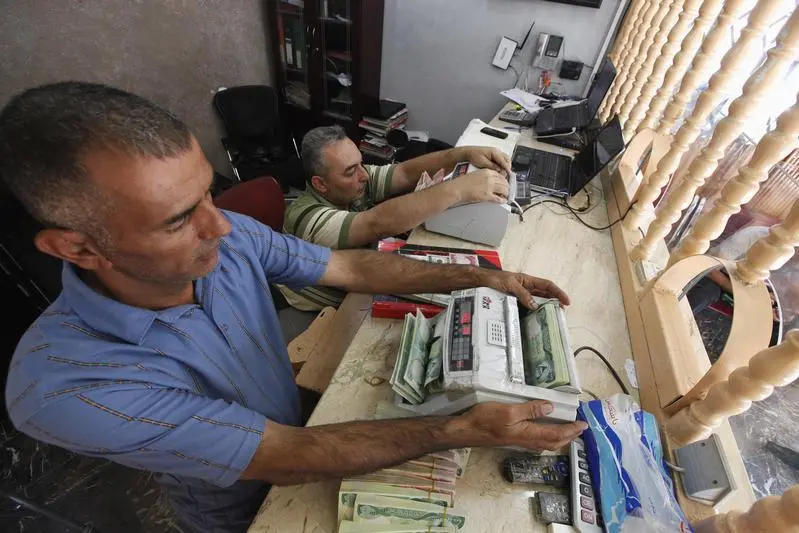PHOTO
* Oil production forecast rising to 3.6 mln bpd
* Assumes extension of oil revenue deal with Erbil
* Fiscal deficit to be filled with loans and bonds
(Adds details, context)
By Stephen Kalin
BAGHDAD, Sept 16 (Reuters) - Iraq's Finance Ministry has proposed a 2016 government budget worth 113.5 trillion Iraqi dinars ($99.65 billion) with a budget deficit of 29.4 trillion Iraqi dinars ($25.81 billion), according to a draft posted online on Wednesday
The budget forecasts oil at around $45 a barrel and average production of 3.6 million barrels per day (bpd), up from the current rate of about 3 million bpd.
As the holder of the world's fifth biggest reserves, oil accounts for around 40 percent of gross domestic product and more than 90 percent of fiscal and current external receipts.
The 2016 budget assumes the continuation of a deal with the Kurdistan Regional Government (KRG) over oil revenues, under which the KRG agreed to transfer up to 550,000 barrels per day to Iraq's state oil firm SOMO in exchange for Baghdad granting Erbil 17 percent of the country's budget payments.
However, the KRG cut allocations to SOMO in June and has steadily increased independent crude oil sales via a pipeline to Turkey, effectively undoing the deal.
Southern oil fields, which account for more than 85 percent of production, are far from areas controlled by Islamic State militants in the north and west. But revenues have been plagued by the more than halving of global oil prices in the past year.
Iraq's deficit is also aggravated by higher military expenditures and other costs associated with the fight against Islamic State, whose advance has internally displaced more than 3 million people according to U.N. statistics.
The budget proposal said the financing gap would be filled with credits from multinational agencies, including the World Bank and the International Monetary Fund, as well as international and local bonds each valued at more than $6 billion.
Iraq is marketing this week its first international bond in nine years, which it hopes will raise up to $6 billion, but that could come at the cost of high interest rates that could worsen its financial problems in the long run. ($1 = 1,139.0000 Iraqi dinars)
(Editing by Ralph Boulton) ((stephen.kalin@thomsonreuters.com; +961 81639179; Reuters Messaging: stephen.kalin.thomsonreuters.com@reuters.net))
* Assumes extension of oil revenue deal with Erbil
* Fiscal deficit to be filled with loans and bonds
(Adds details, context)
By Stephen Kalin
BAGHDAD, Sept 16 (Reuters) - Iraq's Finance Ministry has proposed a 2016 government budget worth 113.5 trillion Iraqi dinars ($99.65 billion) with a budget deficit of 29.4 trillion Iraqi dinars ($25.81 billion), according to a draft posted online on Wednesday
The budget forecasts oil at around $45 a barrel and average production of 3.6 million barrels per day (bpd), up from the current rate of about 3 million bpd.
As the holder of the world's fifth biggest reserves, oil accounts for around 40 percent of gross domestic product and more than 90 percent of fiscal and current external receipts.
The 2016 budget assumes the continuation of a deal with the Kurdistan Regional Government (KRG) over oil revenues, under which the KRG agreed to transfer up to 550,000 barrels per day to Iraq's state oil firm SOMO in exchange for Baghdad granting Erbil 17 percent of the country's budget payments.
However, the KRG cut allocations to SOMO in June and has steadily increased independent crude oil sales via a pipeline to Turkey, effectively undoing the deal.
Southern oil fields, which account for more than 85 percent of production, are far from areas controlled by Islamic State militants in the north and west. But revenues have been plagued by the more than halving of global oil prices in the past year.
Iraq's deficit is also aggravated by higher military expenditures and other costs associated with the fight against Islamic State, whose advance has internally displaced more than 3 million people according to U.N. statistics.
The budget proposal said the financing gap would be filled with credits from multinational agencies, including the World Bank and the International Monetary Fund, as well as international and local bonds each valued at more than $6 billion.
Iraq is marketing this week its first international bond in nine years, which it hopes will raise up to $6 billion, but that could come at the cost of high interest rates that could worsen its financial problems in the long run. ($1 = 1,139.0000 Iraqi dinars)
(Editing by Ralph Boulton) ((stephen.kalin@thomsonreuters.com; +961 81639179; Reuters Messaging: stephen.kalin.thomsonreuters.com@reuters.net))





















